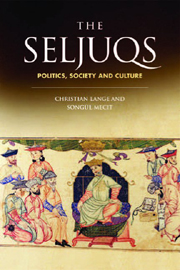Book contents
- Frontmatter
- Contents
- List of figures
- Acknowledgements
- List of abbreviations
- INTRODUCTION
- PART I POLITICS
- 1 THE ORIGINS OF THE SELJUQS
- 2 ASPECTS OF THE COURT OF THE GREAT SELJUQS
- 3 ‘SOVEREIGN AND PIOUS’: THE RELIGIOUS LIFE OF THE GREAT SELJUQ SULTANS
- 4 KINGSHIP AND IDEOLOGY UNDER THE RUM SELJUQS
- 5 SELJUQ LEGITIMACY IN ISLAMIC HISTORY
- PART II SOCIETY
- Part III CULTURE
- Index
3 - ‘SOVEREIGN AND PIOUS’: THE RELIGIOUS LIFE OF THE GREAT SELJUQ SULTANS
from PART I - POLITICS
Published online by Cambridge University Press: 12 September 2012
- Frontmatter
- Contents
- List of figures
- Acknowledgements
- List of abbreviations
- INTRODUCTION
- PART I POLITICS
- 1 THE ORIGINS OF THE SELJUQS
- 2 ASPECTS OF THE COURT OF THE GREAT SELJUQS
- 3 ‘SOVEREIGN AND PIOUS’: THE RELIGIOUS LIFE OF THE GREAT SELJUQ SULTANS
- 4 KINGSHIP AND IDEOLOGY UNDER THE RUM SELJUQS
- 5 SELJUQ LEGITIMACY IN ISLAMIC HISTORY
- PART II SOCIETY
- Part III CULTURE
- Index
Summary
The Seljuqs were, for much of history, remarkably successful in propagating the view of themselves as Sunni heroes: generous supporters of Sunni religious scholarship, staunch champions of the Abbasid caliphs, and indefatigable defenders of Islam against heresy, heretics and Infidels. Their success in projecting this image is reflected in the medieval historiography; the Tārīkh-i guzīda, for instance, after enumerating the flaws of every Muslim dynasty from the Umayyads through the Khwarazmshahs, asseverates: ‘But the Seljuqs were free of these defects: they were Sunni, and of pure religion and good beliefs …’
Similarly fulsome praise of the Seljuqs as the saviours and renewers of Sunni Islam can be found in, for instance, the Saljūqnāma, which states:
It is well known that in the Islamic community after the Ṣaḥāba and the Rāshidūn caliphs … there were no kings who were greater, or more worthy of ruling over humanity, than the kings of the House of Seljuq … How many good [works] were manifested in the days of their dynasty: the revival of the signs of religion, the raising high of the articles of faith of the Muslims; the building and creating of mosques, madrasas, ribāṭs, bridges and stipends … and [the bestowal of] awqāf upon the ʿulamāʾ, sayyids, ascetics and holy people [which] had never been in any period [before] …
- Type
- Chapter
- Information
- The SeljuqsPolitics, Society and Culture, pp. 39 - 62Publisher: Edinburgh University PressPrint publication year: 2011



